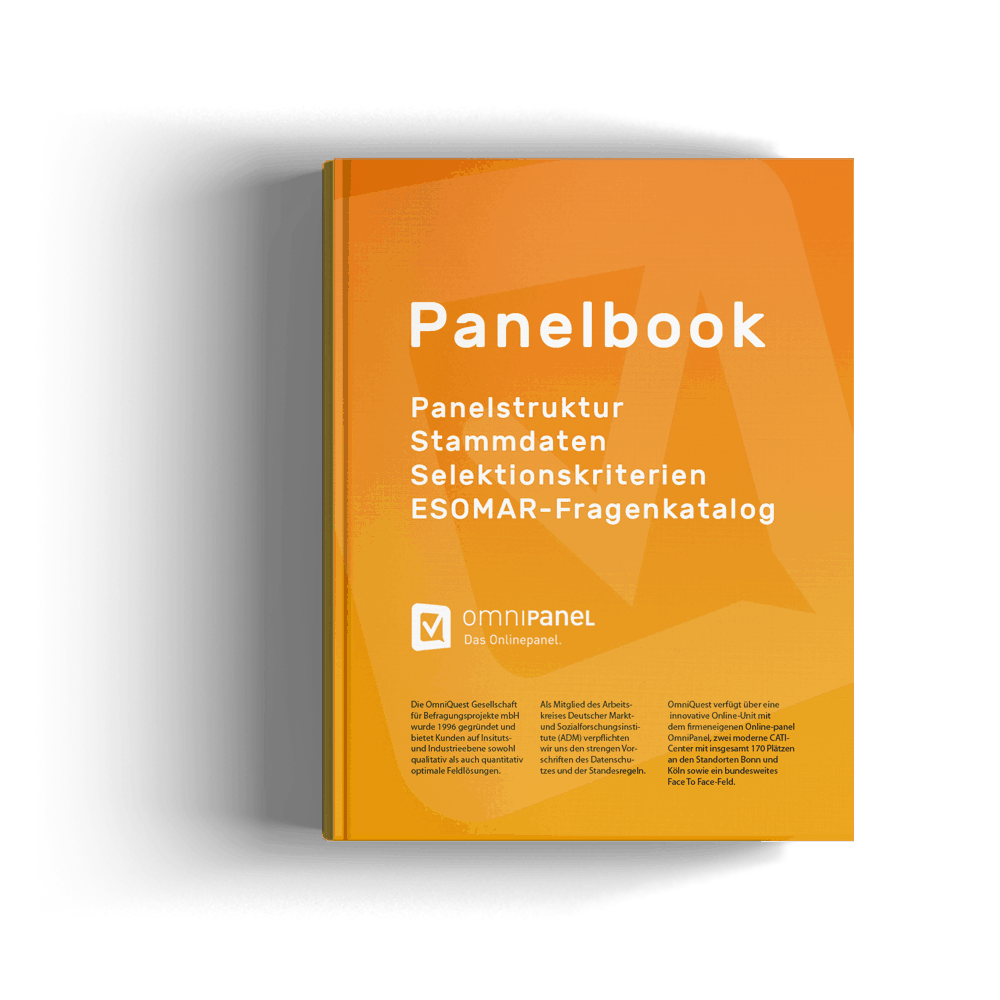Panelbook
OmniQuest is a company specialized in an opinion survey project was founded in 1996 and offers qualitative and quantitative optimal field solutions regarding market and opinion research to renowned clients at institute and industry level.

OmniQuest possesses an innovative online-unit with the company-owned online-panel OmniPanel, two modern CATI centers in Bonn and Cologne having 170 seats in total as well as a stock of 600 face to face interviewers, distributed nationwide. Our professional in-house data management completes our portfolio. Thereby we belong to the biggest field service providers in Germany.
STRUCTURE
The panelstructure
Gender
%
Male
%
Female
Age
- 18 – 19 years 3.7%
- 20 – 29 years 25.3%
- 30 – 39 years 21.5%
- 40 – 49 years 20.3%
- 50 – 59 years 17.1%
- 60 – 64 years 4.9%
- 65 years and older 7.2%
Household size
- 1 person 21.8%
- 2 persons 35.3%
- 3 persons 20.6%
- 4 persons 14.5%
- 5 persons and more 7.8%
Marital status
- Single 34.8%
- Married/Cohabitation 54.3%
- Divorced/Widowed 10.9%
Occupation
- Working fulltime 42.2%
- Working part-time 17.4%
- Currently unemployed 6.5%
- Professional Training (Apprentice, Pupils, Students) 15.2%
- Pensioner, Retiree 8.9%
- Housewife/Househusbands 9.8%
Net income*
- up to 1.000 Euro 15.0%
- 1.001 – 1.500 Euro 16.4%
- 1.501 – 2.000 Euro 15.1%
- 2.001 – 2.500 Euro 12.7%
- 2.501 – 3.000 Euro 9.9%
- 3.001 – 4.000 Euro 8.9%
- 4.001 – 5.000 Euro 3.9%
- 5.001 Euro und mehr 3.2%
- No answer/Don‘t know 14.9%
EFFECTIVE 12/2021
State
- Baden-Würtemberg 10.3%
- Bavaria 13.1%
- Berlin 6.5%
- Brandenburg 3.5%
- Bremen 0.8%
- Hamburg 3.4%
- Hessen 7.2%
- Mecklenburg Western Pomerania 2.4%
- Lower Saxony 8.7%
- Northrhine-Westphalia 21.7%
- Rhineland Palantine 4.6%
- Saarland 1.1%
- Saxony 6.1%
- Saxony-Anhalt 3.0%
- Schleswig-Holstein 3.7%
- Thuringa 3.2%
Auswahlkriterien
Unsere Selektionskriterien

Electronics

Shopping

Mobility (Car, Bicycle, Public Transport)

Travel

Nutrition and Health

Telephone, Mobile Phone & Internet
ESOMAR QUESTIONS
Catalogue of questions
1. What experience does your company have in providing online samples for market research purposes?
OmniQuest is a company spezialized in an opinion survey project was founded in 1996 and stands for professional field solutions using comprehensive methods ever since. We have our own online panel, which has continually grown since 2008 and already features over 64,000 members by now. an interdisciplinary team of experienced project managers coordinates numerous nationwide and international online surveys for renowed clients at institute and industry level and ensures qualitatively and quantitatively optimal field solutions.
Please describe and explain that you offered types of data sources for online
Samples (involves databases to an actively managed Panel, direct marketing lists,
Social networks across the Web collected samples, real time surveys, etc.)?
OmniPanel is an actively managed portfolio Panel. The Panelists are recruited via representative CATI – and face to face trials, as well as online recruiting.
3. If you provide samples from more than one source: How are the different sample sources blended together to ensure validity?
How can this be replicated over time to provide reliability?
How do you deal with the possibility of duplication of respondents across sources?
If there are necessity of using external sample sources in a project, we call upon the service of carefully selected external partner panels. Prerequisite for a possible cooperation is the ESOMAR Membership of the partner. By comparing the survey data in anonymous form, multiple participations are excluded.
4. Are your sample source(s) used solely for market research? If not, what other purposes are they used for?
OmniPanel is solely used for market research purposes.
5. How do you source groups that may be hard to reach on the internet?
Many panel members are reached via recruiting methods, which are integrated in representative, offline CATI- and Face to Face surveys. These surveys take in a large share of the total survey volume of OmniQuest.
6. If, in a particular project, you need to supplement your sample(s) with sample(s) from other providers, how do you select those partners? Is it your policy to notify a client in advance when using a third party provider?
In exceptional cases we call upon the service of carefully selected external partner panels. Prerequisite for a possible cooperation is the ESOMAR Membership of the partner. The inclusion of partner providers is carried out in cooperation with the customer.
7. What steps do you take to achieve a representative sample of the target population?
The measures to be taken are depending to a large extent on the study requirements and any customer requests. The modulation of desired distributions is normally made via quotations. Optionally weightings of the sample depending on actual structural data can be applied after the survey.
8. Do you employ a survey router?
No
9. If you use a router: Please describe the allocation process within your router. How do you decide which surveys might be considered for a respondent? On what priority basis are respondents allocated to surveys?
We do not use a router.
10. If you use a router: Who in your company sets the parameters of the router? Is it a dedicated team or individual project managers?
We do not use a router.
11. If you use a router: What measures do you take to guard against, or mitigate, any bias arising from employing a router? How do you measure and report any bias?
We do not use a router.
12. What profiling data is held on respondents? How is it done? How does this differ across sample sources? How is it kept up-to-date? If no relevant profiling data is held, how are low incidence projects dealt with?
During the registration process, each participant takes part in a master data survey. This study contains approx. 500 criteria, which can be used for sampling and validity checks. The master data are upgraded at least once a year and also at the current survey projects.
13. Please describe your survey invitation process.
What is the proposition that people are offered to take part in individual surveys? What information about the project itself is given in the process? Apart from direct invitations to specific surveys (or to a router), what other means of invitation to surveys are respondents exposed to? You should note that not all invitations to participate take the form of emails.
The panelists receive the invitation with an integrated link to the survey via e -mail or are able to see it in their personal password-protected profile on OmniPanel.de. The invitation includes information about the length of the interview, the amount of proposition and the scheduled timing of the survey. All invitation e-mails also include a unique sender, a link to the privacy policy and our legal notice.
14. Please describe the incentives that respondents are offered for taking part in your surveys. How does this differ by sample source, by interview length, by respondent characteristics?
After successful participations in the surveys, panelists receive bonus points on their personal bonus account. The number of points can vary and depend on the length and type of interview. The exact number of points is announced in advance for each survey within the invitation e-mail.
15. What information about a project do you need in order to give an accurate estimate of feasibility using your own resources?
- Description of the target group (country, demographics, study specific target-group characteristic)
- Number of cases needed
- Ideally the Incidence rate of the target group (if any, otherwise we will be pleased to investigate for you)
- Length of interview
- Quota
- Field time
- Requested services (Sample-only, programming/hosting, kind of data delivery or data analysis)
16. Do you measure respondent satisfaction? Is this information made available to clients?
We ask our panelists on a regular basis in surveys and during updating of their master data about their satisfaction and the comprehensibility of our surveys. In the most recent measurement, 95% of the panelists answered to be (very) satisfied with our studies. Furthermore, there is the opportunity for all participants to contact us via mail for questions and suggestions.
17. What information do you provide to debrief your client after the project has finished?
If required we can supply a field report with information about the completion rate, screen outs and the incidence rate.
18. Who is responsible for data quality checks? If it is you, do you have in place procedures to reduce or eliminate undesired within survey behaviors, such as (a) random responding, (b) Illogical or inconsistent responding, (c) overuse of item non-response (e.g. “Don’t Know”) or (d) speeding (too rapid survey completion)? Please describe these procedures.
We try to avoid undesired response behavior already before the survey start by maximizing the usability for the respondents. At this we provide advice for the customer concerning the length of interview as well as suitability and practicability of the questionnaire with regard to the online methodology.
19. How often can the same individual be contacted to take part in a survey within a specified period whether they respond to the contact or not? How does this vary across your sample sources?
The panelists are invited four times per month on average. Data about the number of ignored and non-ignored invitations are stored in the panel and can be used for filtration of the participants. A panelist can be contacted up to two times within one survey (1 invitation mail and 1 reminder mail).
20. How often can the same individual take part in a survey within a specified period? How does this vary across your sample sources? How do you manage this within categories and/or time periods?
The panelist are invited four times per month to a survey on average. Status information of the participation on other surveys are stored thereby and can be used as exclusion criteria to surveys with similar topics as well as for regulation of the contact- and invitation-frequency.
21. Do you maintain individual level data such as recent participation history, date of entry, source, etc., on your survey respondents? Are you able to supply your client with a project analysis of such individual level data?
Level Data such as date of entry, source and participation history can be monitored by our panel managers at any time and up-to-date.
Disclosure of individual data to customers is not possible for reasons of data protection.
22. Do you have a confirmation of respondent identity procedure? Do you have procedures to detect fraudulent respondents? Please describe these procedures as they are implemented at sample source registration and/or at the point of entry to a survey or router. If you offer B2B samples what are the procedures there, if any?
There is an extensive matching process of multiple entries already during the acquisition of personal data as part of the registration process. Automated duplicate check are used here, who examine the whole panel for profile similarities and display suspicious ones for manual control steps.
23. Please describe the ‘opt-in for market research’ processes for all your online sample sources.
The registration for OmniPanel runs via a double opt-in process. Persons, who want to register themselves are asked to complete a brief registration form with some first general personal information and enter their email address. If an email address is already registered in the panel, there is no possibility to make a new registration. After approval of our privacy policy, the user receives a verification code via email. To become a member of the panel, the email address has to be verified again by clicking on the verification code in the email.
24. lease provide a link to your Privacy Policy. How is your Privacy Policy provided to your respondents?
Our Privacy Policy is available to everyone and can be found via the following link: http://www.omnipanel.de/privacy_policy.php
25. Please describe the measures you take to ensure data protection and security.
OmniQuest GmbH has successfully passed numerous data protection audits within the framework of project implementation as per §11 BDSG (order of data processing). The entire internal organization is in such a way that it conforms to the special requirements of data protection. Several technical and organizational measures for data security and safety have been taken (according to §9 BDSG), which fulfill the legal requirements from entry control ,admission control, access control, disclosure control, input control, order control, availability controls up to the separation rule.
26. What practices do you follow to decide whether online research should be used to present commercially sensitive client data or materials to survey respondents?
In case of programming and hosting of the survey by OmniQuest: The customer receives a testing link before the survey starts to check whether the presentation of his materials corresponds to his expectations. To protect image contents, we are also able to setup an image protection feature by request, which makes storing or screenshotting of images considerably more difficult. If data is to be retrieved of which the results should not be seen by every employee with access to the project, we are able to protect data against unauthorized viewing. In case of a question asking for specific personal data, in which the results are not allowed to be viewed by all employees with access to the project, we can set up a special protection on the question against unauthorized viewing. Furthermore the participants of OmniPanel are “real” verified panelists, who registered themselves in the panel via double-opt-in.
27. Are you certified to any specific quality system? If so, which one(s)?
We are not certified to any specific quality system, but we are obligated to the Compliance of ISO 27001-certification based on the IT-Baseline Protection (IT-fundamental protection). The registration can only be done via a double-opt-in process. Personal data will only be transferred through SSL.
28. Do you conduct online surveys with children and young people? If so, do you adhere to the standards that ESOMAR provides? What other rules or standards, for example COPPA in the United States, do you comply with?
No, we did not conduct any only surveys with children or young people so far. The panel membership requires a minimum age of 18 years. Surveys with children or young people can only be performed via interviewing the registered legal guardians.
OmniPanel has a data protection policy, which is permanently available to the public on the internet and which requires approval during registration process.
The storage of personal Data is carried out in strict compliance to the German Federal Data Protection Act. Surveys and the personal area of the members are SSL encrypted. The server location is certificated in accordance with ISO 27001. The recommendations of ADM and ESOMAR are binding for us.
Contact
Support
Do you still have questions? Simply provide your telephone number or e-mail address and we will get in touch with you.
